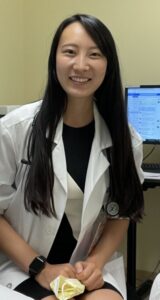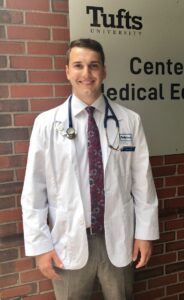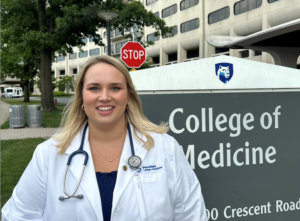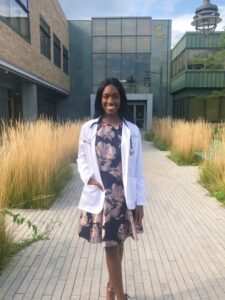Health Profession Alumni Profiles
Mona Deng ’16
 Major: Biology
Major: Biology
Activities at Trinity iHouse (most important extracurricular activity), Shondaa Steppers, Volunteer at the West Hartford Senior Center. If academic activities are included: ISP, research with Dr. Joan Morrison and Dr. Chris Swart; HFP and clinical research with Dr. Margaret McLaren (most important academic activity).
What did you do between college and medical school? One gap year of cell biology research at UConn Health
Medical school/grad year: UCLA David Geffen School of Medicine, Class of 2021
Residency/specialty: UCLA, Internal Medicine
What were the most important things at Trinity that helped you get on to medical school? I took advantage of the liberal arts education, the small class size, and the high faculty-to-student ratio at Trinity. I was able to take many courses in different fields which broadened my horizons, and to dig deep into the subjects I was interested in. These all help build a strong foundation of knowledge and set me up for success in medical school. I was also fortunate to work closely with and learn from many professors at Trinity, especially Dr. Alison Draper, who imparted analytical and interpersonal skills to me through ISP, HFP, and beyond. My study away experience in my Junior year at the Danish Institute for Study Abroad was also transformative. I participated in the Medical Practice and Policy Program with many other students from other colleges in the US and confirmed my passion for medicine.
Michael Zarra ’19
 Major: Neuroscience
Major: Neuroscience
Activities at Trinity: ISP, Health Fellows, Research with Lloyd/Raskin, study abroad at University of Oxford (St. Edmund Hall), Theater and Trinity/La MaMa, Track & Field (feel free to shorten the list if need be. They are in approximate order of importance.)
What did you do between college and medical school? I took two gap years in Boston conducting clinical research with the Orthopaedic and Arthritis Center for Outcomes Research at Brigham and Women’s Hospital. Additionally, I took a supplemental Biochemistry course at Harvard Extension School, prepped for and took the MCAT, and applied to medical school.
Medical school/grad year: Tufts University School of Medicine/Anticipated graduation May 2025
Residency/specialty: Child & Adolescent Psychiatry (still to be officially decided, so I may have to update this as things develop)
What were the most important things at Trinity that helped you get on to medical school? Many prospective students have the idea that they want to go to medical school when applying to college, while others develop the passion and desire later on in their educational journey. For the driven, hardworking, and perseverant student; it makes little difference. So while the temptation might be to ask, “How will Trinity help me to go to medical school?”, the better question is, “How will Trinity help me to decide if I want to go to medical school?”. And the answer to that question is what sets Trinity apart from other top institutions. Primarily, individualized one-on-one mentorship starting in my first-year seminar and continuing through uniquely crafted educational opportunities such as the Health Fellows Program allowed me to discover why I belong in medicine. The liberal arts curriculum allowed me to not only view health and healthcare through traditional Western lenses such as the life sciences and psychology but also through non-traditional lenses including philosophy, religion, and theater. The ability to get involved in applied clinical research on campus afforded me an understanding of how the scientific method turns inquisitiveness into knowledge and knowledge into clinical application. And Trinity’s strong regional reputation offered me the chance to intern at prestigious hospitals in Hartford and Boston. My time at Trinity gave me the experience and, more importantly, the self-understanding I needed to choose to go to medical school.
Natalie Bruno ’20
 Activities at Trinity (include your most important):
Activities at Trinity (include your most important):
Varsity Softball, Quirks A Capella, Student Government Association, ISP Mentor, Student Admissions Associate
What did you do between college and medical school?
I completed a Master of Medical Science at the Robert Larner College of Medicine at UVM and then worked as a medical assistant to pediatric GI at The University of Vermont’s Children’s Hospital
Medical school/grad year:
MS1 at Penn State College of Medicine, MD Candidate Class of 2027
Residency/specialty:
None yet! thinking Internal Medicine and then specializing in Gastroenterology or General Surgery and specializing in colorectal surgery
What were the most important things at Trinity that helped you get on to medical school?
Between my heavy courseload and my extracurricular activities I learned great time management skills and the importance of balancing work and life. I also built an excellent network of friends and mentors that are still the people that I turn to when I am looking for advice, professionally and personally.
Vanessa Ross ’21
 Activities at Trinity: I was a proud ISPer and ISP mentor, member and eventual Co-President of Trinity College Black Women’s Organization (TCBWO), a member and eventual Co-President of the Trinity College Student Chapter of Doctors Without Borders, a member of the Multicultural Affairs Committee (MAC), a member of the Honor Council and a Latin tutor! I also loved modeling every year in the fashion shows held by Trinity’s African Students Association (TASA) and Caribbean Students Association (CSA). Lastly, I studied abroad in Barcelona, Spain during the Winter of my junior year.
Activities at Trinity: I was a proud ISPer and ISP mentor, member and eventual Co-President of Trinity College Black Women’s Organization (TCBWO), a member and eventual Co-President of the Trinity College Student Chapter of Doctors Without Borders, a member of the Multicultural Affairs Committee (MAC), a member of the Honor Council and a Latin tutor! I also loved modeling every year in the fashion shows held by Trinity’s African Students Association (TASA) and Caribbean Students Association (CSA). Lastly, I studied abroad in Barcelona, Spain during the Winter of my junior year.
What did you do between college and medical school? I went straight from Trinity to medical school without gap years.
Medical school/grad year: I am an MS3 at the Donald and Barbara Zucker School of Medicine at Hofstra/Northwell, graduating in May 2025.
Residency/specialty: I am applying into Obstetrics and Gynecology.
What were the most important things at Trinity that helped you get on to medical school? The relationships that I formed with mentors through the ISP were crucial in me having multiple opportunities to conduct research and get publications that helped me stand out to medical schools. Further, through the many clubs and organizations that Trinity offers, I developed leadership skills that prepared me for the challenging environment of medical school.
